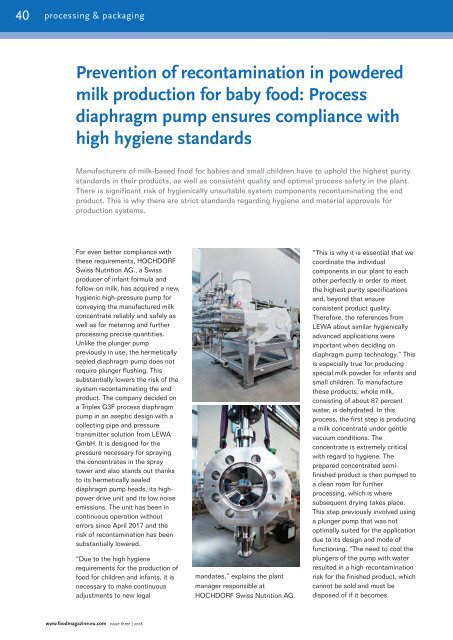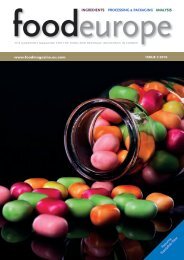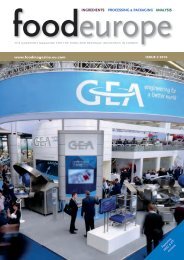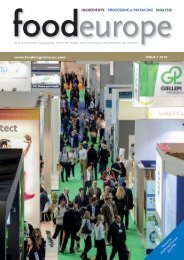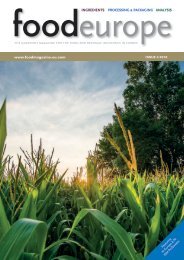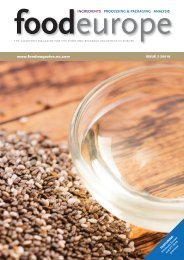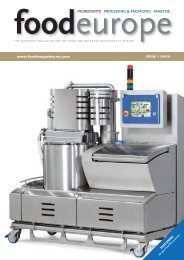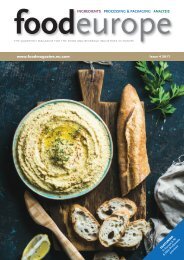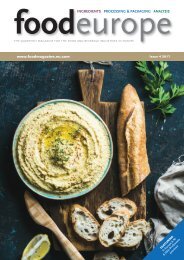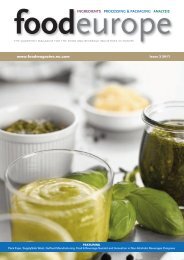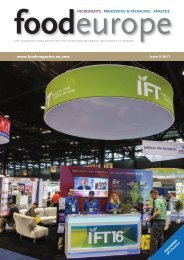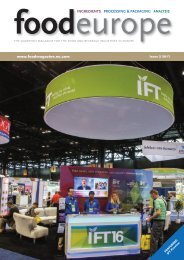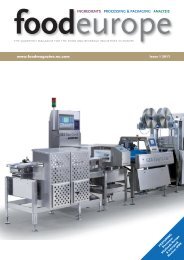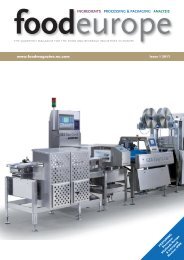issue_3_2018
You also want an ePaper? Increase the reach of your titles
YUMPU automatically turns print PDFs into web optimized ePapers that Google loves.
40<br />
processing & packaging<br />
Prevention of recontamination in powdered<br />
milk production for baby food: Process<br />
diaphragm pump ensures compliance with<br />
high hygiene standards<br />
Manufacturers of milk-based food for babies and small children have to uphold the highest purity<br />
standards in their products, as well as consistent quality and optimal process safety in the plant.<br />
There is significant risk of hygienically unsuitable system components recontaminating the end<br />
product. This is why there are strict standards regarding hygiene and material approvals for<br />
production systems.<br />
For even better compliance with<br />
these requirements, HOCHDORF<br />
Swiss Nutrition AG., a Swiss<br />
producer of infant formula and<br />
follow-on milk, has acquired a new,<br />
hygienic high-pressure pump for<br />
conveying the manufactured milk<br />
concentrate reliably and safely as<br />
well as for metering and further<br />
processing precise quantities.<br />
Unlike the plunger pump<br />
previously in use, the hermetically<br />
sealed diaphragm pump does not<br />
require plunger flushing. This<br />
substantially lowers the risk of the<br />
system recontaminating the end<br />
product. The company decided on<br />
a Triplex G3F process diaphragm<br />
pump in an aseptic design with a<br />
collecting pipe and pressure<br />
transmitter solution from LEWA<br />
GmbH. It is designed for the<br />
pressure necessary for spraying<br />
the concentrates in the spray<br />
tower and also stands out thanks<br />
to its hermetically sealed<br />
diaphragm pump heads, its highpower<br />
drive unit and its low noise<br />
emissions. The unit has been in<br />
continuous operation without<br />
errors since April 2017 and the<br />
risk of recontamination has been<br />
substantially lowered.<br />
“Due to the high hygiene<br />
requirements for the production of<br />
food for children and infants, it is<br />
necessary to make continuous<br />
adjustments to new legal<br />
mandates,” explains the plant<br />
manager responsible at<br />
HOCHDORF Swiss Nutrition AG.<br />
“This is why it is essential that we<br />
coordinate the individual<br />
components in our plant to each<br />
other perfectly in order to meet<br />
the highest purity specifications<br />
and, beyond that ensure<br />
consistent product quality.<br />
Therefore, the references from<br />
LEWA about similar hygienically<br />
advanced applications were<br />
important when deciding on<br />
diaphragm pump technology.” This<br />
is especially true for producing<br />
special milk powder for infants and<br />
small children. To manufacture<br />
these products, whole milk,<br />
consisting of about 87 percent<br />
water, is dehydrated. In this<br />
process, the first step is producing<br />
a milk concentrate under gentle<br />
vacuum conditions. The<br />
concentrate is extremely critical<br />
with regard to hygiene. The<br />
prepared concentrated semifinished<br />
product is then pumped to<br />
a clean room for further<br />
processing, which is where<br />
subsequent drying takes place.<br />
This step previously involved using<br />
a plunger pump that was not<br />
optimally suited for the application<br />
due to its design and mode of<br />
functioning. “The need to cool the<br />
plungers of the pump with water<br />
resulted in a high recontamination<br />
risk for the finished product, which<br />
cannot be sold and must be<br />
disposed of if it becomes<br />
www.foodmagazine.eu.com <strong>issue</strong> three | <strong>2018</strong>


